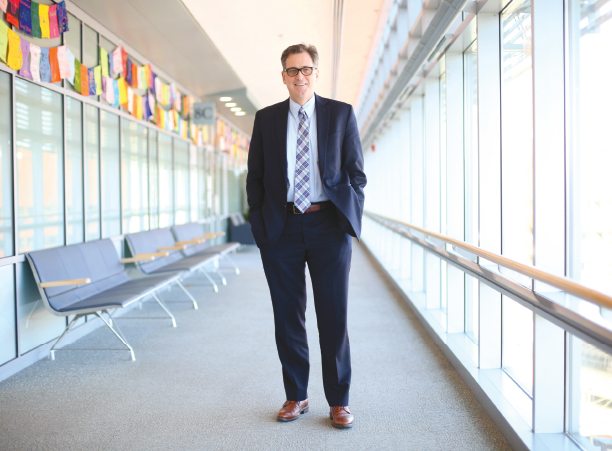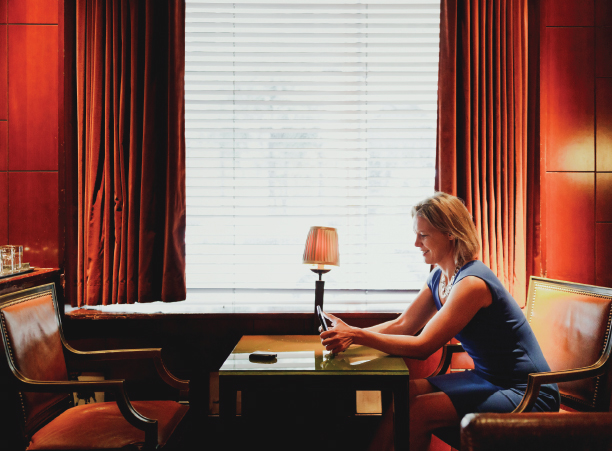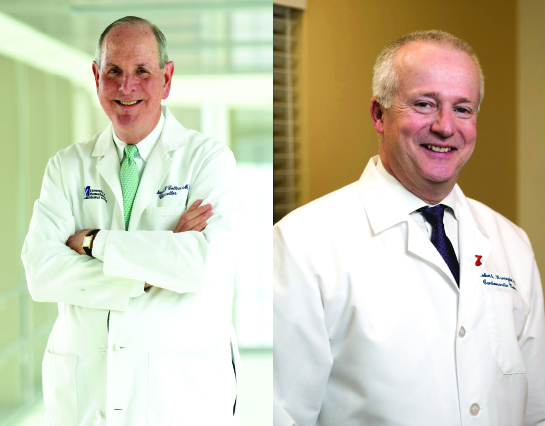classics, a weekly one-on-one session on the Greek classics that he took when he was an upperclassman at Holy Cross.
Harrington would write a paper on an assigned topic from the “Odyssey” or the “Aeneid,” but he would never turn it in. Instead, it formed a basis of conversation between student and teacher. As Harrington read his paper, Hamilton interrupted and questioned him intensely, forcing his student to explain everything from his overall perspective right down to his choice of words.
“It taught me a lot about my ability to research a topic and think deeply on a topic, perhaps with minimal guidance, and to be able to defend my argument and my point of view,” Harrington says. “I think back on that now and I think it was one of the most valuable educational experiences I had.”
That experience and the rest of his undergraduate education at Holy Cross have served Harrington well. A cardiologist and clinical investigator, he is a professor of medicine and chairman of the Department of Medicine at Stanford University.
He is among scores of alumni — including Michael Collins ’77, David Ryan ’88 and Jennifer Schneider ’97 — who have made a mark in medicine and attribute their success and contributions, in large part, to their early preparation at Holy Cross. They say the school’s diverse liberal arts offerings, challenging science courses and Jesuit mission to serve helped shape them into the doctors they are today.
Finding a role in the world and seeing how that fits with your spiritual views is “incredibly helpful,” says Ryan, chief of oncology and hematology at Massachusetts General Hospital and a professor of medicine at Harvard Medical School.
“The hard choices that you have in life are going to come to you no matter what, whether you’re an oncologist or a teacher or a police officer or whatever your line of work,” he says. “To have a context for how to manage those hard choices and approach them is incredibly important. And I think a place like
Where the Humanities and Sciences Intersect
 David Ryan ’88, pictured here in Mass General Hospital, notes his combination of English and science studies were a perfect precursor to medical school. Photo by Tom Rettig
David Ryan ’88, pictured here in Mass General Hospital, notes his combination of English and science studies were a perfect precursor to medical school. Photo by Tom Rettig“Back then, I was given four choices: Holy Cross, Fordham, Georgetown and Boston College,” he recalls. Two older siblings had gone to Holy Cross (as would his wife, his two younger siblings and his son), so he applied.
“I got in and I never looked back. It was awesome.”
He loved to read and sciences came easily, so he majored in English and took the science courses he would need for medical school. The combination clicked.
“Doing something outside the sciences is incredibly important,” Ryan says. He just returned from Shanghai, China, where Mass General is helping set up a Western-style cancer center. “It teaches you how to think, how to analyze text, how to come up with your own opinion and to communicate that opinion. I thought it was a terrific exposure to how to think and formulate opinions.”
In his current position at Mass General, Ryan practices as an oncologist specializing in stomach, pancreas and colon cancers; oversees clinical research at the MGH Cancer Center; and administers the hospital’s department of oncology and hematology.
He and Vicki Jackson, the chief of palliative care at MGH, recently wrote a book, “Living With Cancer,” a guide to treatment and coping, similar in approach to “What to Expect When You’re Expecting,” the popular pregnancy reference. In layman’s terms, “Living With Cancer” combines information for patients and families on oncology and palliative care, taking a whole-person approach.
“I’ve always tried to emphasize we give patients the best chance for the best case scenario,” Ryan says. That includes standard therapy, clinical trials and, when the time comes, palliative care. “Taking care of the whole person really has been the cornerstone of my career.”
The Jesuit mission, he says, in which service is paramount, has greatly influenced that career.
“What am I being called to do, in a personal sense and in a broader sense, for my community? You were constantly encouraged to think about that, in ways that were explicit and implicit,” he says.
Concern for the Whole Person
 Jennifer Schneider ’97 waits in The Clift hotel in San Francisco after taking a meeting. Jennifer is the Chief Medical Officer of Livongo Health which develops technologies to empower people living with chronic conditions, like diabetes and hypertension, and she oversees trials and outcomes. Photo by Jon Sun
Jennifer Schneider ’97 waits in The Clift hotel in San Francisco after taking a meeting. Jennifer is the Chief Medical Officer of Livongo Health which develops technologies to empower people living with chronic conditions, like diabetes and hypertension, and she oversees trials and outcomes. Photo by Jon Sun“In many ways, because of liberal arts, I think I’ve been successful in medicine,” she says. “To succeed in medicine, you need work ethic and principles and structure,’’ all things she began developing in her undergraduate days.
Schneider describes herself as being a “pretty geeky student-athlete” at Holy Cross, someone who ran track and cross-country, studied late into the night and often went to 11 p.m. Mass — her time to reflect at the end of the day.
Despite the demands of her position, the mother of three children under 10 somehow finds time to compete in triathlons, and in 2016 completed an Ironman in Santa Rosa, California, swimming 2.4 miles, biking 112 miles and running 26.2 miles. “It was hard,” she says. “I decided to go for it and I did it.”
Schneider says technology has yet to revolutionize the health care industry as it has others. Her company develops products to empower people living with chronic conditions, like diabetes and hypertension, and she oversees trials and outcomes.
Herself a Type 1 diabetic for 30 years, Schneider says Livongo uses technology to combine testing, real-time information, support and behavior tracking to make managing the disease easier.
“It’s a lot of little choices every day for the rest of your life,” she says. “It’s not a one-and-done deal, so the ability to influence behavior at the right time is really critical.”
Hospitals are not effective at taking care of people with chronic conditions, according to Schneider, because they traditionally treat people with acute problems — heart attacks and broken legs. So-called disruptive technologies like those at Livongo are changing the model, putting the patient at the center of his or her care, she says.
And she feels her ability to successfully do that stems in part from the Jesuit idea of mission. “How can you ask and figure out the very hard analytical scientific question while you’re dealing with people’s lives?”
A Lifelong Holy Cross Connection
 Michael Collins ’77 (left) and Robert Harrington ’82 (right) first met at a busy Boston Emergency Room, where Harrington shadowed Collins. Over 35 years later, the two remain close friends, even though they are on opposite coasts. Photo by Steve Fisch Photography
Michael Collins ’77 (left) and Robert Harrington ’82 (right) first met at a busy Boston Emergency Room, where Harrington shadowed Collins. Over 35 years later, the two remain close friends, even though they are on opposite coasts. Photo by Steve Fisch PhotographyAs an Irish-Italian kid who grew up in Somerville, Mass., and went to Catholic grammar and high schools, Harrington said there wasn’t much doubt what kind of college he’d attend.
“Where did all the nuns recommend that the graduates go?” he said. “The only guidance I got was to apply to Catholic schools.”
So that’s what he did. Boston College, Notre Dame, Georgetown, Villanova and Holy Cross, plus the public UMass.
At Holy Cross, Harrington began as a chemistry major, but found himself enjoying the humanities more, so he switched his major to English in his sophomore year, yet continued in the premed track with courses in chemistry, biology, physics and biochemistry.
He found when he got to medical school that he benefited greatly from his liberal arts background, able to read and absorb great volumes of information, and to reflect and communicate on it.
“My life now revolves largely around thinking about data, thinking about information and turning that into the spoken or written word,” he said.
Collins, who majored in chemistry, feels he was well prepared in the sciences, but says he doesn’t use a lot of organic chemistry in his position as chancellor of the University of Massachusetts Medical School, where he oversees more than 1,000 graduate-level students and more than 6,000 employees.
“The ability to read and write and to do some of the finer arts, these are skills that prepared me very well for this,” he said, and that’s something he passes along to future medical students. “If you want to be a music major, go be a music major.”
Though Harrington and Collins graduated from Holy Cross five years apart, they have a professional relationship and friendship that has spanned 35 years.
It began during Harrington’s senior year, when Collins, who was working 100 hours a week as an intern at St. Elizabeth’s Medical Center in Boston, became a mentor to Harrington, at the suggestion of Holy Cross adviser Mike McGrath.
“I will never forget how gracious and kind and caring he was,” Harrington says of Collins. “He’s been one of the most important influences of my life.”
At the time, Harrington was struggling to deal with his mother’s death and his sudden role as legal guardian of his teenage sister.
Harrington met Collins on a Saturday, when he shadowed him on a busy night in a Boston emergency room. Something sparked between them, and they’ve been in touch ever since.
Harrington still turns to Collins for advice on big medical decisions and for the occasional kick in the backside “when needed.”
And Harrington has paid it forward, mentoring dozens of postdoctoral cardiology research fellows.
Collins calls mentoring “an unusual gift” that benefits mentee and mentor. “He gave me more gifts than I ever gave him,” he says. “It’s the joy of watching what he’s accomplished, it’s the joy of seeing the physician that he’s become, it’s the conversations that we have all the time about his own career and what he’s thinking. And that continues to this day.”
Not a day goes by that Collins does not mentor a high school, college or medical student, a resident or a young practitioner. If someone contacts him, he responds within 24 hours.
“It’s the most important thing I do every day,” he says.
For both Harrington and Collins, the Jesuit mission shaped their careers as physicians.
Collins stresses with students that it’s a privilege for doctors to care for patients, not a privilege for the patients to be cared for by doctors.
Harrington says it would be hard to leave Holy Cross without a love of learning and the willingness to “poke and prod” and challenge conventional wisdom. And that would make Professor Hamilton very proud.
Written by Dave Greenslit for the Winter 2018 issue of Holy Cross Magazine.
About Holy Cross Magazine
Holy Cross Magazine (HCM) is the quarterly alumni publication of the College of the Holy Cross. The award-winning publication is mailed to alumni and friends of the College and includes intriguing profiles, make-you-think features, alumni news, exclusive photos and more. Visit magazine.holycross.edu/about to contact HCM, submit alumni class notes, milestones, or letters to the editor.
Related Information
Additional Coverage
- PR Newswire, Dec. 18, 2018: Livongo Promotes Jennifer Schneider to President

